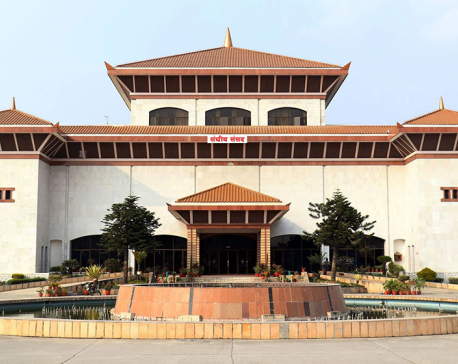
OR
The constitution of Nepal promulgated in 2015 has been considered a promising document at home and abroad, in part, because it has enshrined 31 sets of fundamental rights of the citizens. Our list of fundamental rights is comprehensive. These rights—ranging from right to freedom to food security to right of children—can bear fruit only when necessary laws are enacted on time and the required regulations of those laws are put in place. In our case, however, it must be said that both law making and regulations drafting processes have been rather too slow. First, the government did not demonstrate the required level of urgency to enact the necessary laws on fundamental rights on time. Many of the laws were drafted in the last hours, without adequate deliberations. For example, of the 16 new bills necessary for the implementation of fundamental rights, 14 were registered in parliament in the last two months when the constitutional deadline for endorsement was inching closer.
We are witnessing the same level of delay and indifference toward promulgating various sets of regulations to help people to exercise their fundamental rights. It has been found that of the 16 regulations to be promulgated by various ministries just one has come into effect so far, more than a year after the enforcement of various 16 new laws to ensure the constitutionally-guaranteed fundamental rights of the citizens. Needless to say, this will have direct bearing on citizens’ right to exercise fundamental rights such as rights to free education, personal privacy and rights to land, health, consumer, children, among others. As things stand, none of the necessary regulations have been promulgated so far except for one related to the implementation of Right to Employment promulgated by the Ministry of Labor and Employment. The regulations related to the Rights Related to Land, Public Security, Personal Privacy and Environment Protection, Caste-based discrimination and untouchability and Social Security have not been drafted even 16 months after enforcement of the corresponding laws. Similarly, the regulations on the Right to Safe Motherhood and Reproductive Health, Public Health, Right to Residence, Food Security, Free Education and Protection of Victims of Crime are either in the process of being drafted or awaiting decisions at various authorities.
The Delegated Management and Government Assurance Committee of the parliament, which is responsible for scrutinizing the implementation of fundamental rights of the citizens by the government, claims that a regulation for implementation of the right of individuals with disabilities is awaiting cabinet approval for promulgation. Another regulation related to implementation of Rights Related to Children is in the final stage of drafting and the one aimed at implementing the Rights of Consumer is at the Ministry of Law, Justice and Parliamentary Affairs for correction following a cabinet approval. Even so, a lot many regulations are yet to be drafted. Thus the government must speed up the process of promulgating the necessary regulations. The government seems focused on introducing the controversial bills that could curtail press freedom and centralize powers. It should shift attention toward enacting the vital regulations, for without them the citizens won’t be able to exercise their fundamental rights.
You May Like This

The right to be seen
While much of the developed world is properly worried about myriad privacy outrages, many around the world are posing a... Read More...

Bill related to fundamental rights by September 18 at any cost: Speaker
KATHMANDU, Sept 6: Speaker Krishna Bahadur Mahara has said that the parliament would pass the bill related to the fundamental... Read More...

No laws on fundamental rights ready though deadline ends Sept 19
KATHMANDU, Sept 4: The government has failed to formulate even a single law essential for the implement of the newly-introduced fundamental... Read More...





Just In
- CM Kandel requests Finance Minister Pun to put Karnali province in priority in upcoming budget
- Australia reduces TR visa age limit and duration as it implements stricter regulations for foreign students
- Govt aims to surpass Rs 10 trillion GDP mark in next five years
- Govt appoints 77 Liaison Officers for mountain climbing management for spring season
- EC decides to permit public vehicles to operate freely on day of by-election
- Fugitive arrested after 26 years
- Indian Potash Ltd secures contract to bring 30,000 tons of urea within 107 days
- CAN adds four players to squad for T20 series against West Indies 'A'













Leave A Comment